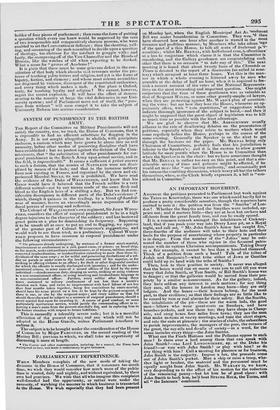PARLIAMENTARY IMPERTINENCE.
WHEN Members complain of the new mode of taking the divisions in the House of Commons, that it consumes too much time, we wish they would consider how much more of the public time is wasted, daily and nightly, and without equivalent, by their .own bad practices. We wish that all who imagine this complaint well-founded had the opportunity, or rather were under the necessity, of watching the manner in which business is transacted an the House. We wish especially that they had been present
on Monday last, when the English Municipal Act At.lendinent Bill was under Zonsideration in Committee. They wou.1/41 then have observed bow one hour after another is sessile(' in the most tiresome and profitless manner, by Members who take advan.safle of the quiet of a thin House, to talk all sorts of rrelevant pin's sonalities; whilst Mr. BERNAL, with half-closed eves,is oftentimes' at a loss to conjecture which clause it is that the Committee is considering, and the Gallery gentlemen are congratulating each other that there is no occasion " to take any of this." The next morning it is found that about twenty lines of the Chronicle or Times is devoted to the report of a discussion (so called in sour- tear) which occupied at least three hours. Yet this is the man- lier in which a whole evening is frittered away by men who grumble at the delay of half an hour, when it is required to fur- nish a correct account of the votes of the National Representa- tives on the most interesting and important question. One might conjecture that the time of these gentlemen was as valuable as that of Sergeant WILDS, or some other greatly-employed lawyer, when they are protesting against Mr. WARDS plan of ascertain- ing the votes: but see how they bore the House, whenever an op- portunity offers, with " vain repetitions," or suggestions which indicate thorough ignorance of the subject in hand,—and then it might be supposed that the great object of legislation was to kill as much time as possible with the least advantage.
We are glad to observe that Mr. ABERCROMBY usually adheres to the rule of disallowing debates on the presentation of petitions, especially when they relate to matters which would come regularly before the House, perhaps in the course of the same evening. Generally the Speaker is on the alert to get through the business on the paper. Mr. BERNAL being only Chairman of Committees, probably feels that his jurisdiction is inferior to the Speaker's ; and it is the custom to allow greater latitude for mere prattle when the House is in Committee than when the Speaker is in the chair: but we have sometimes thought that Mr. BERNAL is rather too easy on this point, and that a con- siderable saving of time and patience might be effected, if he would act more like "one having authority," and occasionally put his vetoon the rambling discussions, which weary all but the talkers themselves, when, as the Clerk briefly expresses it, a bill is "con- sidered in Committee."


























 Previous page
Previous page